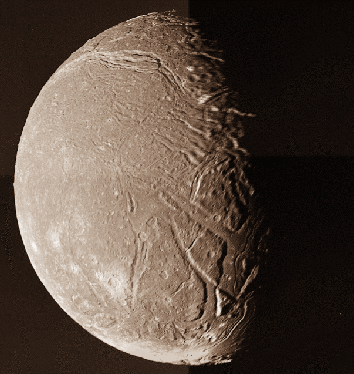Astronomy Picture of the Day
Discover the cosmos!
Each day a different image or photograph of our fascinating universe is
featured, along with a brief explanation written by a professional
astronomer.
March 3, 1996

Uranus' Moon Ariel: Valley World
Photo Credit:
NASA, Voyager 2,
Copyright Calvin J. Hamilton
Explanation:
What formed
Ariel's valleys?
This question presented itself when
Voyager 2
passed this satellite of
Uranus in January 1986.
Speculation includes that heating caused by the ancient tides of
Uranus caused moonquakes and massive shifting of the moon's surface. In any
event, a huge network of sunken valleys was found to cover this frozen
moon, and some unknown material now coats the bottoms of many of these
channels.
Ariel is the second closest to Uranus outside of
Miranda, and is
composed of roughly half water ice and half rock. Ariel was discovered by
William Lassell in 1851.
Information:
The
Scale of the Universe Debate in April 1996
Tomorrow's picture: Uranus' Largest Moon: Titania
| Archive
| Index
| Search
| Glossary
| Education
| About APOD |




Authors & editors:
Robert Nemiroff
(GMU) &
Jerry
Bonnell (USRA).
NASA Technical Rep.:
Sherri
Calvo.
Specific rights apply.
A service of:
LHEA
at
NASA/
GSFC




